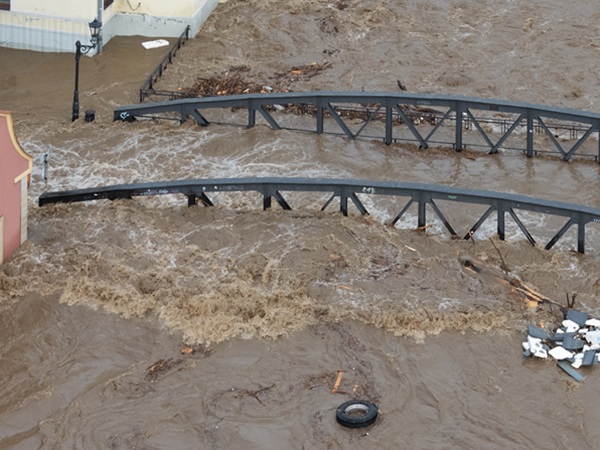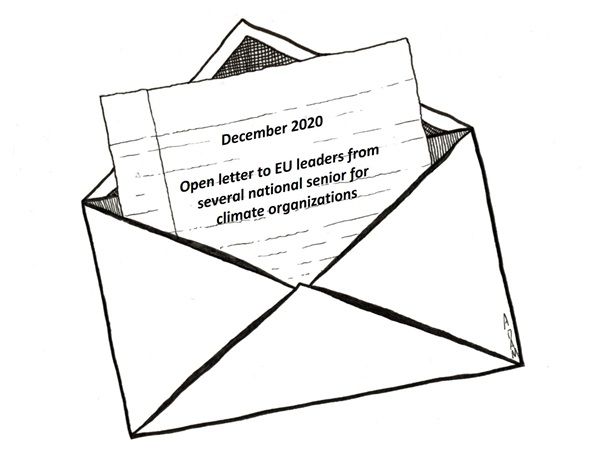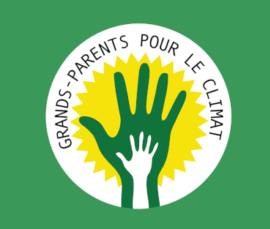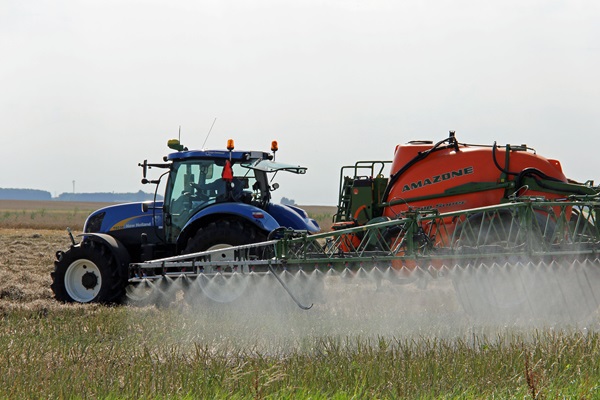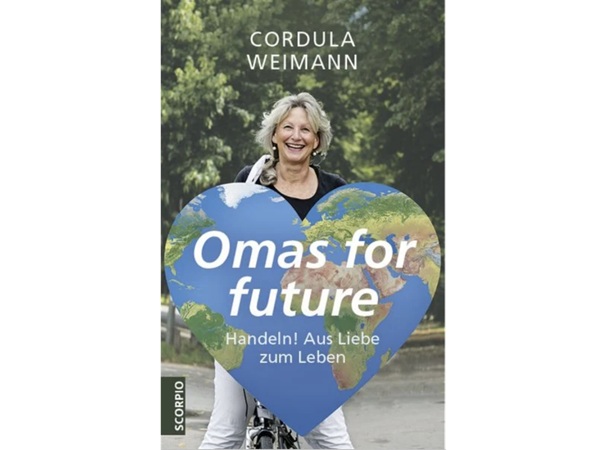It’s not the weather. It’s us!

Without words. © Wetter-Unwetter Deutschland Niederschlesien
Prof. em. Dr. Jan Stel, former EGC co-chair
For too long humanity has considered nature as a resource to exploit for its benefit. Yet, these benefits are unfairly distributed. Strong anthropogenic changes marked the second half of the last century. These changes expressed themselves in population growth, a rapid global and freshwater consumption, in a rapid development of new technologies and new synthetic products, like fertilizers and plastics as well as the ‘unlimited’ and rampant use of fossil energy, polluting the atmosphere, etc.
Homo sapiens, the self-proclaimed ‘wise man’ – introduced in 1758 by Carl Linnaeus, who was himself also the type specimen of this species – mostly reflects a traditional Christian world-view towards nature. Our history is riddled with mutual atrocities and attempts to ‘subdue’ nature with new technologies. We have cut down the forests to replace them for agriculture, we have exterminated animal species, we have tamed rivers through the construction of structures, such as dykes and dams. Just in Europe there are 1,117 dams constructed. (Nature, 23-02-2023). Since the 1950s we are even conquering space, indicating the exploration of the solar system of which the Earth is part. The ‘wise man’ has a hubris problem.
Our current scale of human activities now outstrips the Earth carrying capacity. However, flirting with the planetary boundaries equals a dangerous play with the planetary drivers of the Earth System. With this we are entering the big unknowns, the voids in our knowledge and understanding of nature, which produced us and of which we are just a part. The consequences of our attitude towards nature and trespassing six out of nine planetary boundaries, are forcefully boomeranging like during Storm Boris.
Discussion about the ‘Water Bomb’ in Central Europe: It is not climate change! It is the weather they say on the television! According to an Austrian woman with her head in the sand.
The pollution trap
Just look around! Everywhere you see the signs that we are a highly polluting species. Going back into deep history, traces of waste are now interesting finds for archaeologists and historians. Traces of Roman lead pollution are still found in the frozen record of ice cores. They give us a window into our past. Medieval waste pits tell us about daily life back then. However, some 300 years ago, the British energy transition from wood to coal changed, in the name of progress, our world from a local to global level, and opened a pollution Pandora’s box: the triple planetary crisis.
According to the UN, the triple planetary crisis refers to the three main interlinked issues that humanity created and is currently facing: climate change, pollution and biodiversity loss. Each of these issues has its own causes and effects, and each issue needs to be resolved if we are to have a viable future on this planet. In other words, if we want to have a just world in which we can live and prosper. Climate change, the focus of the European Grandparents for Climate, is the most pressing issue facing humanity today.
The Climate crisis or emergency is caused by greenhouse gases pollution (CO2 and CH4) damaging the atmosphere and ocean by human activities. Almost everything we do releases emissions, but energy use, industry, transport, buildings and agriculture are the main causes for release of greenhouse gases to the atmosphere. The consequences of our climate change can be seen every day and everywhere. If you want you can notice it through the increased intensity and severity of droughts, water scarcity, wildfires, rising sea levels, flooding, melting polar ice, extreme weather events and declining biodiversity, as well as little but fundamental changes in one’s garden.
A message from Deep Time
There are some simple basics in understanding our climate change. First, to place it in a geological perspective, a long-term view of the global mean surface temperature is needed to understanding the history of the planet to be able to put our present-day climate change into context. Such a view has been published in Science of September 20, and relates to the last half a billion years. The main message is that the Earth’s temperature has varied between 11° and 36°C over the past 485 million years, that the planet has spent more time in warmer climate states than cold ones, and that CO2 is the dominant driver of climate change during the last 485 million years, in shaping Earth history.
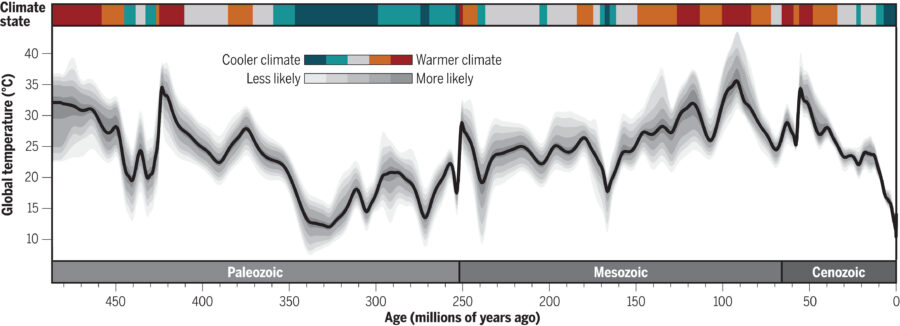
The grey shading in this graph, corresponds to different confidence levels, and the black line shows the average solution. The coloured bands along the top reflect the climate state, with cooler colours indicating the various icehouse climates, warmer colours indicating various greenhouse climates, while the grey colour represents a transitional state. During almost half a billion years, there were five massive mass extinctions, killing 60-90% of all life. Source: Judd, et al. A 485-million-year history of Earth’s surface temperature, Science 20-09-2024.
Second, our species is an Ice Age species, which developed just some 300,000 years ago. During the last 2 million years there was an impressive succession of ice ages showing CO2 fluctuations varying between 180-270 ppm. Just like all species within the home genus, we have witnessed many dramatic natural climate changes and variations. Yet, we, Homo sapiens, the self-proclaimed ‘wise man’, is creating its own climate change with light speed and unknown in the Earth’s history.
Homo sapiens, the in 1758 self-proclaimed ‘wise man’, is creating its own, climate change at light speed. Life on the planet will survive as deep history shows, but what will it mean for us to live in a warm or even a hothouse world for which we are not adapted?
Today, the Earth is warming faster than at any time during the last half a billion years. As well as the many species we share the planet with, we have evolved in and adapted to a cold climate phase in the planet’s history. Today, we are changing the climate in such a way that it becomes completely unsuitable for humans. Yes, the planet has been warmer before and can get warmer again, but humans and animals can’t adapt that quickly. Another message from the geological record is that major climate changes have already led to a series of mass extinctions in the past. Yet, never by the activities of just one species, the ‘wise man’.
How to make a ‘water bomb’?
Especially during our lifetime, we have increased the CO2 concentration from at least 313 ppm at the first reading from the famous Keeling Curve at Hawaii’s Mauna Loa Observatory on March 29, 1958 was 313 ppm. This was already well above the Ice Age upper limit of 270 ppm. Today’s (September 20, 2024) reading is 421.99 ppm. As a consequence, this signal is far into the red. We have to go back for millions of years into our deep history, to match this level. And that would bring us in an alien world, with much higher temperatures and a nine meters sea-level increase.
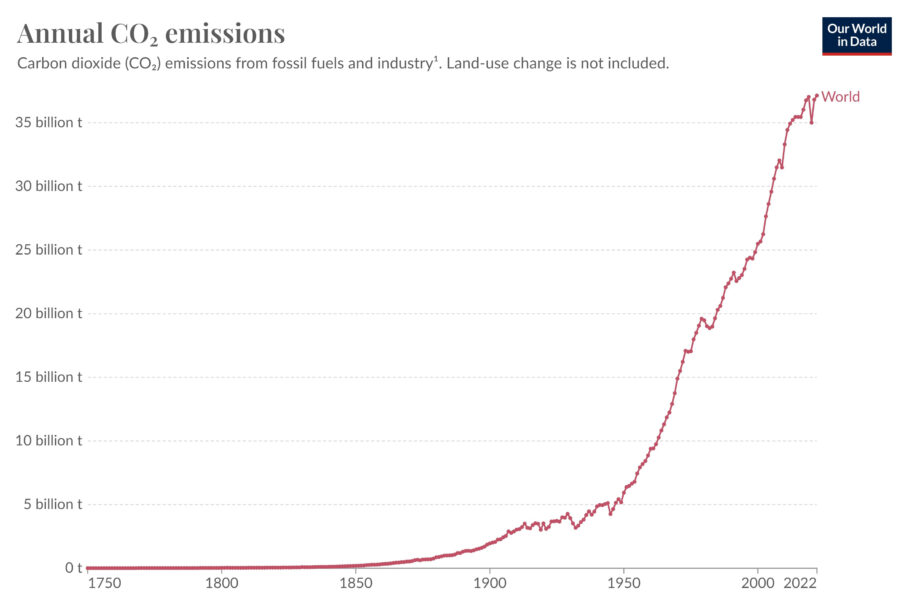
Based upon the 2023 Global Carbon Budget, revised in January 2024. © Our World in Data.
Our climate change is warming the different parts of the planet at various speeds. Particularly, the warming in the Arctic is very fast, as well as the warming in the upper atmosphere in the tropics. In the Arctic this is leading to the disappearance of its sea-ice cover, which is affecting a global weather pattern as well as the Arctic ecosystems. Our climate warming also is weakening the north–south temperature gradient in the Northern Hemisphere. This also is affecting the polar and subtropical jet streams, which weakens and becomes more ‘wavier”, possibly leading to atmospheric blocking as was the case during the Central Europe water bomb, which is not an official meteorological term. It is an invention of the Italian tabloid media in 2014.
Due to our accelerated CO2 pollution, the atmosphere is heating as well as the ocean, which absorbs more than 90% of excess heat, leading to ocean warming. The ocean’s top few meters store as much heat as Earth’s entire atmosphere. Moreover, the ocean absorbs 30% of human-induced CO2 emissions, and produces about half of Earth’s oxygen. Our CO2 pollution will cost us dearly both on land and in the ocean, which is changing rapidly due to human activities. Both the number and lengths of heatwaves above the land as well as within the ocean is increasing rapidly. The heating of the Mediterranean Sea also was a crucial factor in shaping the ‘water bomb’ in Central Europa, as it was feeding the low-pressure system with water.
Seen in this context the spontaneous reaction of an Austrian woman, suffering the consequences of this water bomb on a reference to our climate change as the cause is unbelievable. She said it is not our climate change but, according to television, just the weather. That shocking and sad comment testifies to a large climate literacy gap. This in a time that, according to the Eurobarometer of July 2023, 77% of the European population think climate change is a very serious problem, while seven countries consider it as the most serious problem facing the world. These countries are: Belgium, Denmark, Germany, Ireland, Malta, the Netherlands, Austria, Finland, and Sweden. I think that the European Grandparents for Climate should address this climate literacy gap.
A changed European perspective?
This year has been the biggest election year in human history. Half of the world’s population, some 3.7 billion people in 72 countries were allowed to go to the polls. During the European elections just 50.74% of the population voted, while the European Union is our collective strength at the global level. Ursula von der Leyen obtained her second term. On September 9, former European Central Bank (ECB) president Mario Draghi presented his report The future of European competitiveness, which was written on request of Von der Leyen.
In this report three common threads are formulated, which primarily relate to the European economy: decarbonisation, defence and technology. To stay in the global game the EU should raise its spending by € 800 billion a year. But where is our climate change, with its triple planetary crisis? Nothing about the lesson of Storm Boris, which showered up to five times the average monthly rainfall for September in just four days, or the wild fires in Portugal and Greece. Nothing about the lack of political will to make us more prepared for these kinds of storms. Nothing about the fact that the climate breakdown and not Russia or China, is by far the biggest threat to global security. Nothing about the threat of Homo Sapiens, as a species, to its natural environment and the economic costs thereof.
In his influential advice to European Commission President Ursula von der Leyen, Mario Draghi formulates three threats to the European economy: decarbonisation, defence and technology. Nothing about the triple planetary crisis!
On September 18, European Commission President Ursula von der Leyen presented her new team, which will start on December 1, at a plenary session of the European Parliament in Strasbourg. According to Le Monde “…. Ursula von der Leyen has just demonstrated that she is a woman of power and that she knows how to navigate the balance of power”. I am not sure that this is a hopeful statement. Since Frans Timmermans, the father of the European Green Deal, left the Commission, the responsibility for the Green Deal was divided between two people. This is the case again now.
Executive vice-president Teresa Ribera Rodríguez (Spain, S&D; Clean, Just and Competitive Transition, DG COMP) also is responsible for some aspects of the green transition. According to Von der Leyen the “Green Deal stays on as a pillar of the EU’s growth strategy but alongside new priorities such as security and competitiveness”. Commissioner Wopke Hoeskstra (The Netherlands, EPP, Climate, Net Zero and Clean Growth, DG CLIMA and Taxation, DG TAXUD) is popping up again as the main counterbalance for Teresa Ribera. His nomination might be seen as fulfilling the EPP-pledge before the EP-elections that the green transition serves as the bloc’s industrial growth plan.
The comments of Bas Eickhout MEP, President of the Greens/EFA Group in the European Parliament, speak volumes. He said: “It’s good to see that the urgent need to counter climate change will remain at the core of EU policy making for the new mandate. But we need clarity on how the new portfolios dealing with climate change and decarbonisation will work in practice.” As European Grandparents for Climate we should be on the lookout!
Just bad luck?
For the population living in Central and East Europe this disaster indeed is just bad luck. The consequences of a blocked low-pressure system defy every imagination, and will be remembered. But it is not only Europe that is suffering. In early September, Typhoon Yagi swept through northern Vietnam, Laos, Thailand and Myanmar killing more than 500 people, and triggering severe floods and mudslides in Myanmar. In Nigeria torrential rains caused the collapse of a dam, whose maintenance had been neglected for years … freeing some 300 prisoners.
We are increasingly passing the 1.5oC warming of the 2015 Paris Agreement. We are in crucial years and we can, if we want, change the system which is blocking progress towards a sustainable and just world. There for the main mission of the European Grandparents for Climate, to strive for full implementation of the European Green Deal, holds and should be guarded. And that is a lot of work. As well as a strong commitment and responsibility.
